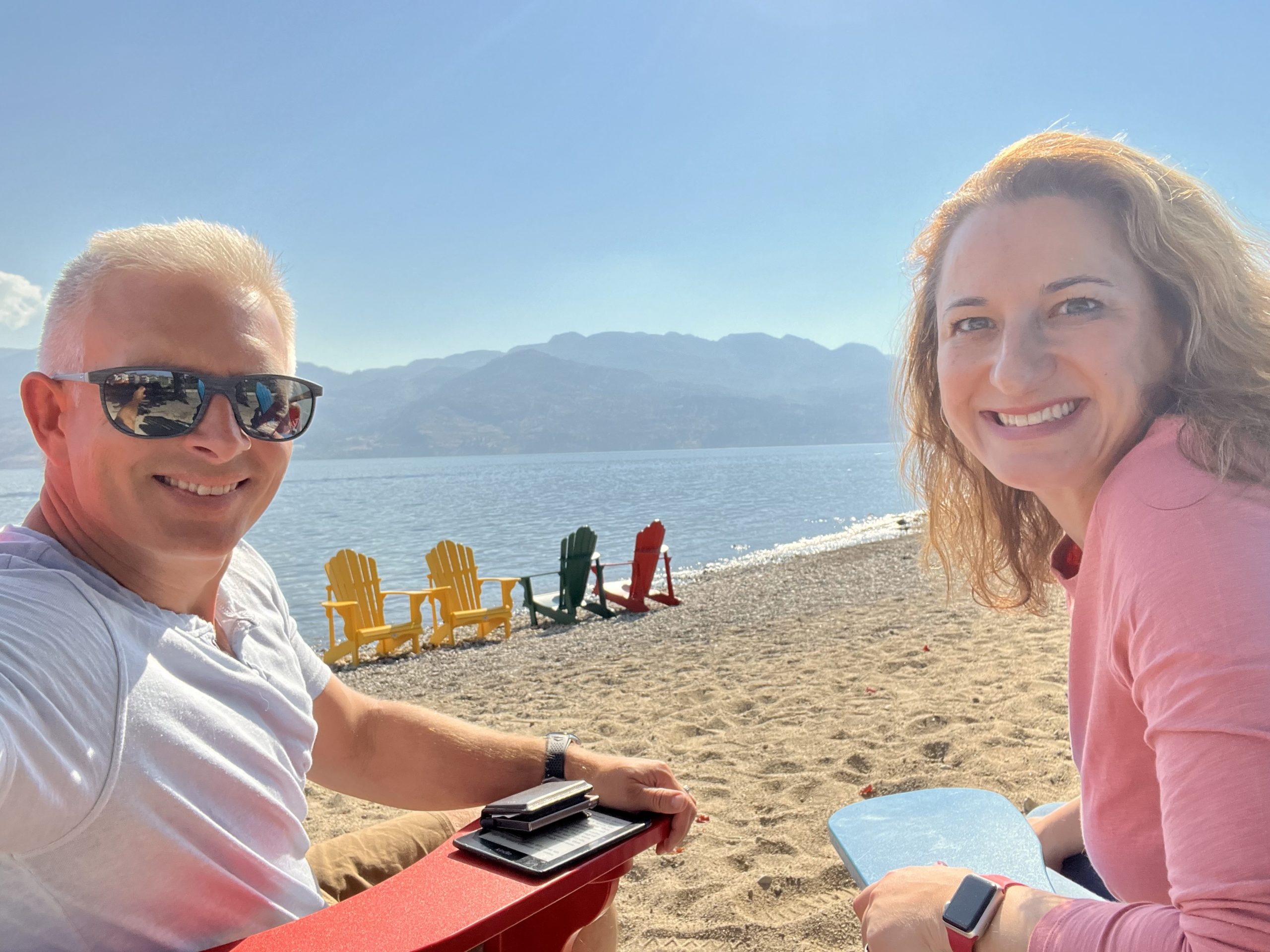Happy October! I hope everyone has been enjoying the incredible stretch of fall weather. I was away in Whistler at a conference last week, and it sure felt good to show off what an amazing part of the world we live in to my Eastern-based colleagues! Hearing the advisors from Ontario moaning about $1.67/L gas back home made being able to walk around the village in short sleeves especially gratifying!
Thanksgiving was great. Usually, long weekends are for soccer tournaments at our house, but with my youngest son off in University, I am not coaching a team this year for the first time in 30 years. It felt a bit strange to have nothing really to do aside from our family dinner. A bit of nostalgia pain when my wife and I were out for dinner one night and saw a bunch of kids’ teams being marched around by their coaches looking for a place for dinner for their teams. Surrey was hosting the U17 National Championships this year, and there was some regret in not being part of the action, but I also felt blessed to have a truly “free” long weekend!
I am incredibly grateful for the excellent weather in that I am pretty sure it has been keeping my clients distracted from looking too closely at statements right now! For those looking for a quick technical summation, markets still suck! Unprecedented weather is appreciated; unprecedented in markets causes panic!
I’ve decided to drop my market updates to quarterly for the foreseeable future. Partially to keep you from looking too often at the bad news, partly because it eases my workload a bit, but mostly because we are re-entering a more normalized post covid economy. As much as there is a lot to talk about daily, the economy’s long-term direction is being played out in slow motion as the primary determinants are forces that take time to work themselves through the system.
There are lots of interesting things going on at a micro level economically. There are currently two job openings for every applicant right now. The UK had to completely backtrack on their new government’s economic plan, which the IMF deemed so bad that they came out with a recommendation to Prime Minister Liz Truss that she might want to “rethink” their budget. The clean energy sector narrative is reading like a retelling of “The Emperor has no Clothes” as Europe is scrambling to fulfill its energy needs going into winter with the Russian/Ukraine conflict still ongoing. How exactly is cutting down trees to burn wood pellets for fuel considered clean energy? And despite all the doom and gloom, earnings reports have been largely positive for most companies across the board.
None of that matters.
It is the macroeconomic news that is the driving force behind markets right now. I have been talking about it for a while, but inflation and the corresponding interest rate hikes are the only thing that currently matters. Inflation is at a 40-year high, and interest rates getting hiked is the government reaction to the threat inflation poses.
There are several legitimate reasons to worry.
Persistent high inflation is bad for growth and bad for social stability. The IMF is on record insisting that controlling inflation should take precedence over the economy. The problem is that raising interest rates is the primary fiscal tool for fighting inflation. It is a very blunt instrument to use for a very complex issue. Imagine being a builder where the only tool you have is a hammer, and you get an idea as to the scope of the difficulty.
The complicating issue currently is that much of the inflation stems from geopolitics rather than economics. Leftover pandemic supply chain issues and the Russia/Ukraine war probably account for half of the inflation right now. It doesn’t matter how hard you swing it; no hammer is going to lower energy costs until the war ends.
It is almost inevitable that the sharp interest rate hikes will push us into recession. Financial headlines are dominated by all sorts of doom-and-gloom scenarios on where the economy will go. Here is where I think it is crucial to keep some perspective. While there are some very smart people making economic forecasts, please keep in mind what needs to happen for an economist or financial pundit to be right on what markets will do over the next year. First, they need to be right on where inflation peaks out. Then they need to judge what interest rates hit in response to inflation accurately. That will allow them to form a hypothesis on what the economy will do, assuming they have correctly accounted for what has happened between Russia and Ukraine over the year. If they got all those predictions correct, and nothing unexpected came out of the woodwork, they would still need to understand and account for how investors and consumers feel about the above. At that point, you would have an accurate forecast! Hopefully, you are getting an idea as to why I am a bit cynical when it comes to relying on any economic forecast when building portfolios!
The 2nd thing that I think is important to remember is that a recession is just economics’ way of correcting imbalances in the market. It is a culling of the herd. Once the imbalances are taken care of, the economy is free to kick on. It is a healthy part of an economic cycle. The really interesting part of our economy right now is that despite all the economic doom and gloom, there aren’t too many pockets of excess right now. We are talking about an economy currently at full employment, stock valuations well within normal ranges, and companies with healthy earnings. Average net worth is almost double what it was in 2019.
Fundamentally, we are looking at a predominately service-based economy that shifted to a goods-based economy due to the pandemic. Demand held up, supply failed. Now, as we return to “normal” we need to work through the demand backlog for goods and services as things reopen and we shift back to a services-based economy.
These are very modest problems for an economic recession to correct—cyclical issues rather than structural ones. Recency bias comes into play, though, when we look at what the last few recessions brought us.
COVID shut down the whole world in 2020, the global real estate market melted down in 2008 when mortgage-backed securities imploded, and 2003 brought a tech crash when the irrational exuberance of the dot-com bubble burst. Those weren’t simple recessions that needed to balance out market excess. Those were markets breaking! But those are the most recent reference points people think of when they hear the word “recession”.
Most major indices are down over 25% right now. The pain in portfolios is genuine and compounded by the fact that those alternative assets that are supposed to help diversify away some of the volatility (gold, real estate, bonds, alternative asset classes) are all down too. Sentiment indicators are more pessimistic now than at the peak of COVID.
Markets are beaten up and stressed, worried that we will hit recessionary levels as severe as the last few.
Assuming we will get a recession like the last few would be like me booking a surfing holiday on the beach in Tofino for next Thanksgiving based on last weekend’s weather. It would have been great this year, but my iPhone just popped a photo up on my screen, reminding me that at this time, a few years ago, I was coaching a soccer game in the snow!

October 2016

October 2022
I am happy to give you an educated guess on what I think will happen over the next few months. I am fascinated by the challenge of analyzing all the financial data points and geopolitical inputs and trying to weigh their significance and likelihood. Nothing in current data inputs indicates we will get anything other than a “typical” recession. Nothing is structurally broken. The economy contracts, the excess gets squeezed, people stop spending, innovation gets stimulated, rates stabilize, and spending picks back up. But as much fun as I have in throwing my two cents into forecasting, I hope, at the very least, I have convinced you that it is essentially pointless.
The dedication needs to be to the long-term fundamentals. It is identifying and committing to solid companies that are innovating and growing their businesses based on needed products and services. That is where we need to focus our attention. We don’t want our energy and focus taken away by things outside our control, and we don’t make our plans based on extremes. We make our vacation plans based on seasonal averages of places we want to go, not based on record highs or lows. No matter what happened this year, I am booking Hawaii at Thanksgiving rather than Vancouver if I want a sunny getaway in October 2023!
Markets are suffering based on a few very extreme factors – this is not a crisis but an opportunity. Markets being down over 20% means, historically, we are more likely to be up next year. According to a study from Miller Value partners LLC1, any time you get a market drop of 20%, based on historical performance, investors who are patient or contribute have high odds of being materially up over the next five years, and 2/3 of the time, they are up within a year.
We don’t want portfolios that will only flourish in a high inflation environment with rising rates, exacerbated by the geopolitical uncertainty of an ongoing war and lingering pandemic. We set ourselves up so that we will do well in a stable economy where growth comes from good businesses innovating to meet demand. The way markets are most of the time, despite how it may feel today!
Be patient, be opportunistic where possible, and trust the durability of the businesses we invest in!
The information provided here is general in nature and should not be considered personal investment advice or solicitation to buy or sell any securities. It may include information concerning financial markets as at particular point in time and is subject to change without notice. Every effort has been made to compile it from reliable sources, however, no warranty can be made as to its accuracy or completeness. The views expressed here are those of the authors and writers only and not necessarily those of Worldsource Securities Inc., its employees or affiliates. There may also be projections or other “forward-looking statements.” There is significant risk that forward looking statements will not prove to be accurate and actual results, performance or achievements could differ materially from any future results, performance or achievements that may be expressed or implied by such forward-looking statements and you will not unduly rely on such forward-looking statements. Before acting on any of the information provided, please contact your advisor for individual financial advice based on your personal circumstances.
Reference:
- Samantha McLemore, ” Plea(sing) For the Long Term”, Miller Value

leave a comment